The Amish of Jamesport, Missouri
Last month, contributor Don Burke gave us a look at the Kalona, Iowa Amish settlement. Don returns today with a selection of photos from the Jamesport, Missouri Amish community.
At eight church districts, Jamesport (Daviess County) is the third-largest of Missouri’s three dozen+ Amish settlements, smaller than only Seymour (Webster County) and Clark (Audrain/Monroe/Randolph County). Founded in 1953, only the Bowling Green community is older among the Show-Me State’s Amish settlements.
Not only does Don take fine photographs, he also shares some interesting background info on what we’re seeing here.
You can view full-size versions of these and many other Jamesport Amish photos at Don’s Flickr page. The commentary from here on out is all Don’s.
The Amish population is scattered all around the Jamesport area, including these scenic country roads on either side of Hwy 190 south of town.
The Amish version of the family mini-van.
The Amish buggies — and the way they differ from community to community — is something I find curious. You will notice here that the buggy doors are rigid and open by sliding back (which seemed to be the more typical way in Jamesport).
“Amish eyes are watching you” (with due apologies to Hall & Oates). Most of my Amish pictures are taken from a distance with a telephoto lens (usually in the 300-500mm range). And in a surprisingly high percentage of the time, when I look at the pictures on computer I find that the Amish have spotted me.
For those that may have questions about photographing the Amish, I was told by an older Amish gentleman in this community that such pictures taken from a distance are usually not a problem. Like anyone else, the Amish do not want to be gawked at, have a camera shoved in their face, or be treated like animals on display at the zoo. Communities that are more open to tourism generally understand that curiosity — and pictures — are a part of the tourist mentality. But customs vary from one community to the next…, and common courtesy is always in order.
A self-service vegetable stand on the road beside an Amish farm.
This is the only time that I have seen something like this, and I’m inclined to think that it might be frowned upon in more conservative Amish communities. But this commemorated the passing of one of the family’s sons/brothers.
The term “Amish buggy” covers a wide variety of sizes and shapes. Often called a “courting buggy” (but used for many other purposes), this one-bench two-wheel buggy is lighter and may be pulled by a “pony” (as is likely the case here).
An AirLife membership decal inside the Amish buggy.
A bit unexpected to see an AirLife decal in an Amish buggy. The Amish vary from group to group, so this is not likely true for all Amish, but I have been quite surprised to find out that many do not see modern things as a sin as much as they see them as a distraction from more important things.
Many will have access to a phone, but not have one in the house because it would be more of a distraction to the more important family interactions. Similarly, they are not opposed to modern medicines or the high-speed ways of getting to it…, but until that is needed, the more simple means of a buggy-ride through the country side will work just fine.
Being in rural farm settings, the Amish are naturally faced with a number of insect problems. But instead of chemical spraying, the Amish prefer to use more natural means — birds, and especially the purple martin. Whether using a more traditional design or a contemporary look (as here), martin houses are quite common on Amish farms.
The Miller Farm in Jamesport builds martin houses. It is also the site of an annual open house in early June showcasing the nests (most with eggs or hatchlings) of over 100 pairs of martins.
Buggies in a field during an Amish wedding.
Because of growing Amish populations in areas of limited or expensive farmland, it is becoming increasing common for the Amish to work in various “English” businesses. Young men often work in construction or other manual labor jobs. Young ladies, until the time that they get married and stay home raising their own family, may work in local businesses or occasionally as a school teacher in the parochial school.
Located at the main intersection in town (the only 4-way stop in Jamesport) is the Gingerich Dutch Pantry. It is owned by a Mennonite family who used to be Amish.
The decals on this buggy seem uncharacteristic for typical Amish buggies. I can’t say for sure, but it is possible that this buggy belongs to an Amish teen during his/her time of Rumspringa.
Here, again, practices vary from one community to the next, with some communities not observing this tradition at all. But in the Jamesport area Rumspringa is a time when the teens are allowed a greater degree of freedom, such as the chance to wear “English” (non-Amish) clothes, trick-out their buggies (decals, “boom-boxes”, etc.), the occasional buggy-drag-race, and staying out later at night.
But as one person wisely observed, the thrill of being able to stay out to midnight often loses its luster when the teen still has to get up at 4:00 the next morning to milk the cows that didn’t care how late they were up or how little sleep they got.
A weathered plank swing in an Amish school yard.
A swing set and see-saws are common Amish school yard fixtures. The shed on the right has firewood for the school’s wood stove. The white building behind the shed is one of the two outhouses — another common school yard fixture.
While all Amish that I am aware of are “off the grid” when it comes to electricity from public utilities, some communities do allow the use of electricity from solar panels (such as this one on an Amish schoolhouse) or from generators (in certain situations).
A small stable beside the school where the teacher’s horse and students’ ponies would be kept during school hours.
Backstops like this are also a staple in Amish school yards, although often not quite this big, and usually without the bench seating as seen here.
The schoolhouse bell.
Desks that were once used in an Amish schoolhouse.
Returning home with the day’s purchase from the annual school fund raiser auction.
You can’t visit every Amish community…this is about the next best thing. A big thanks to Don.


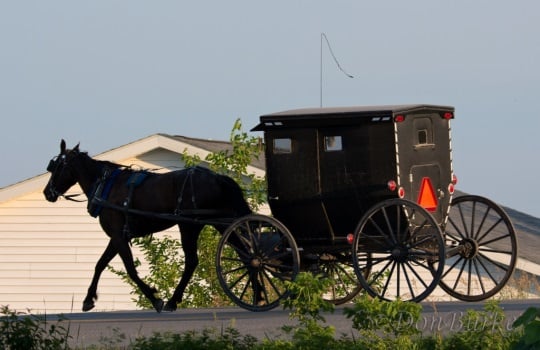

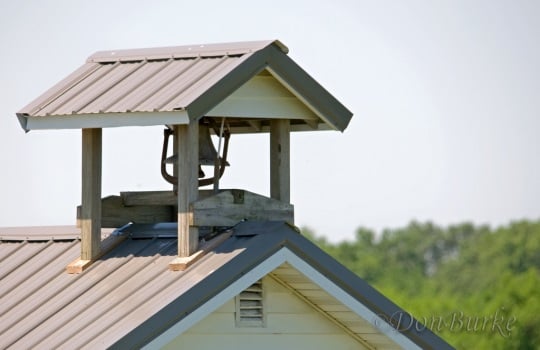

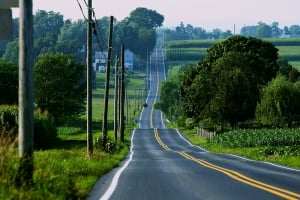
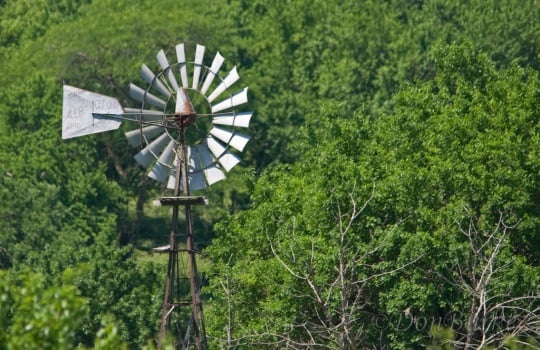

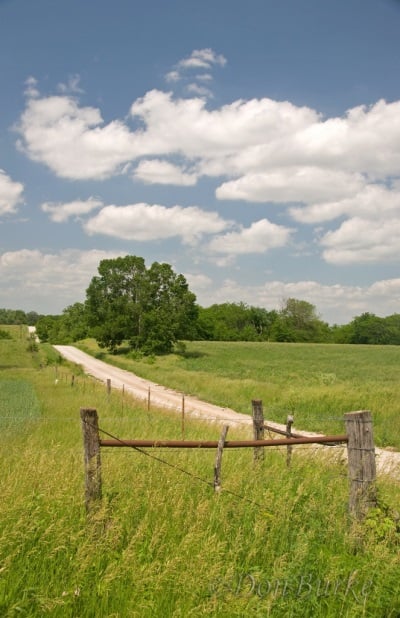

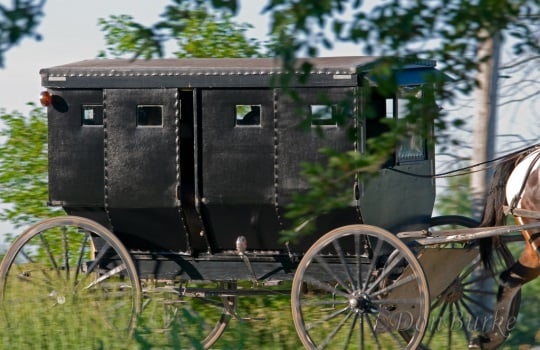


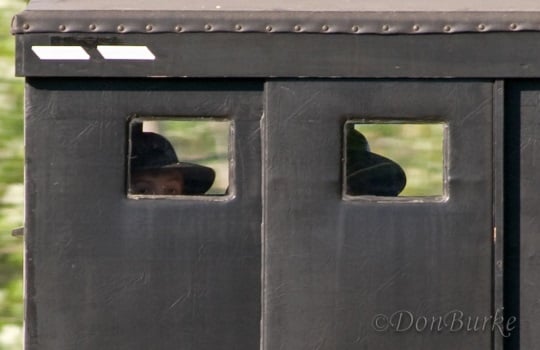
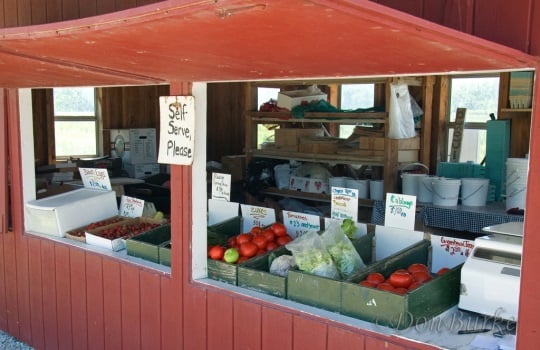

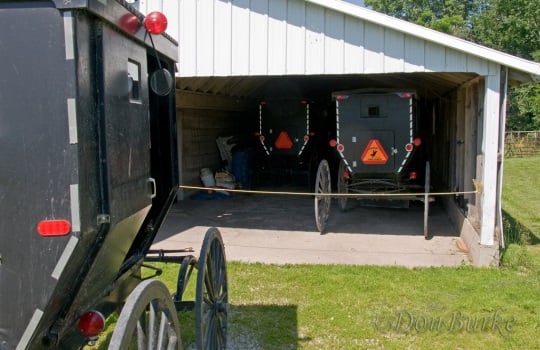
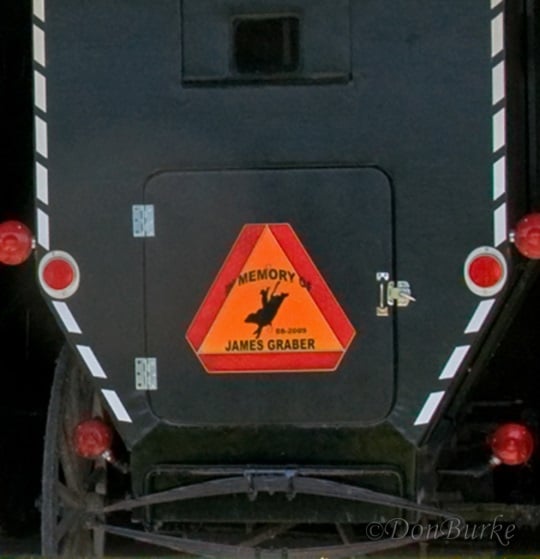
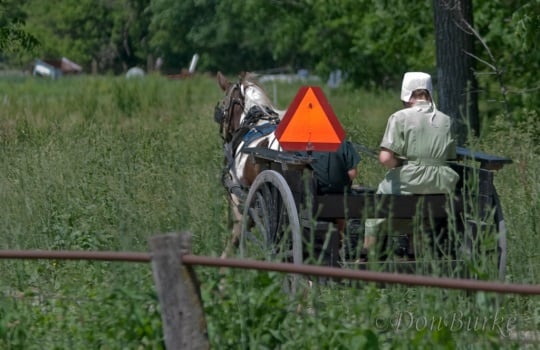
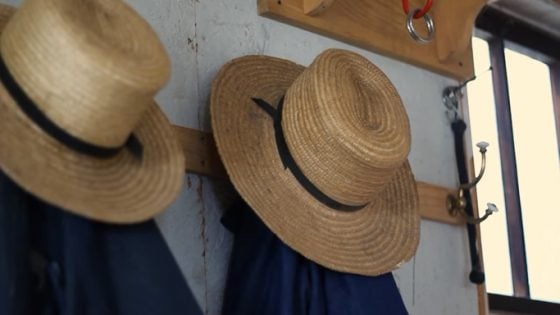
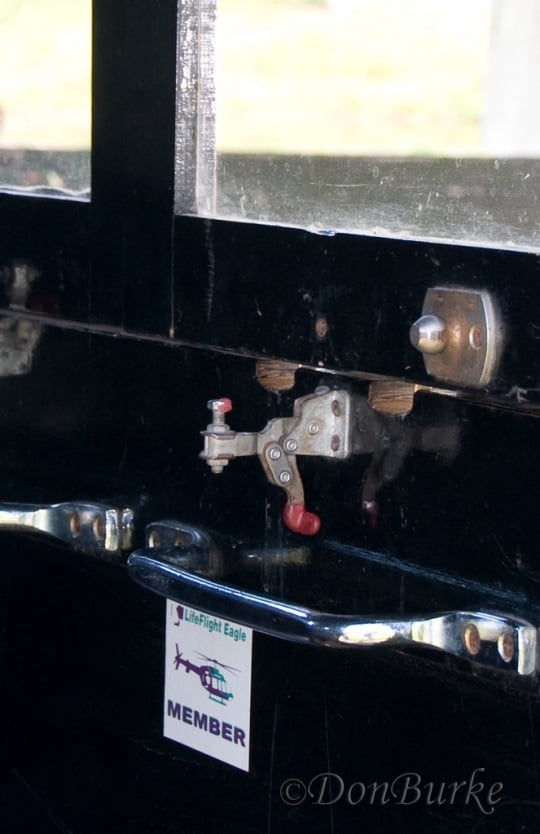





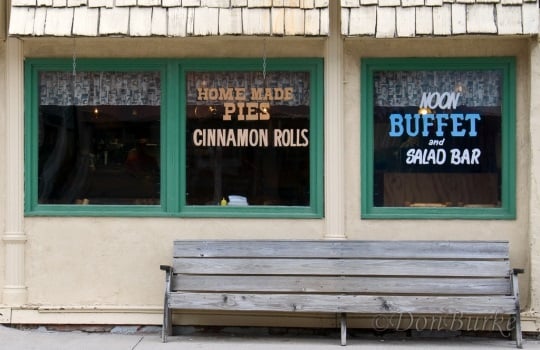
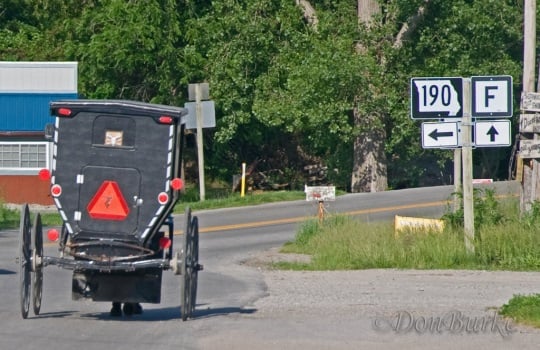
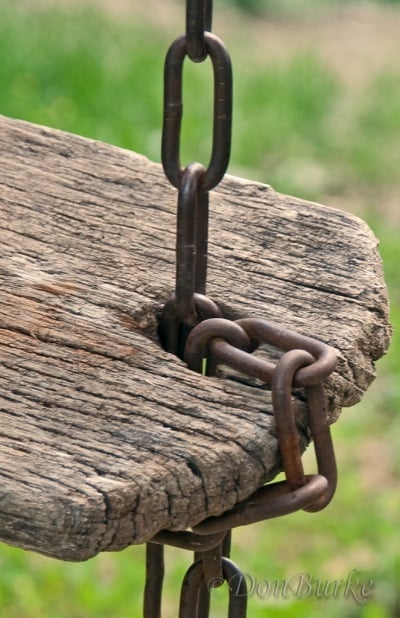
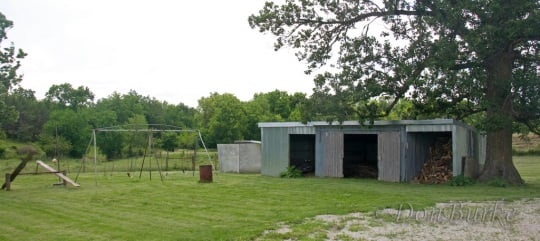
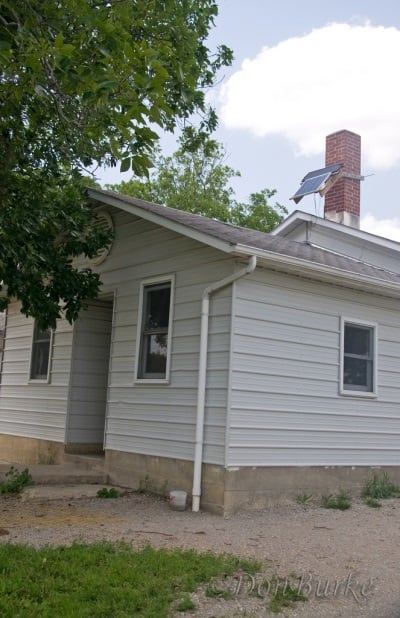
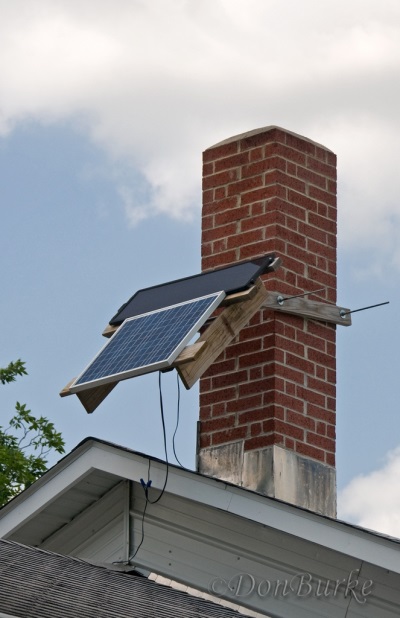
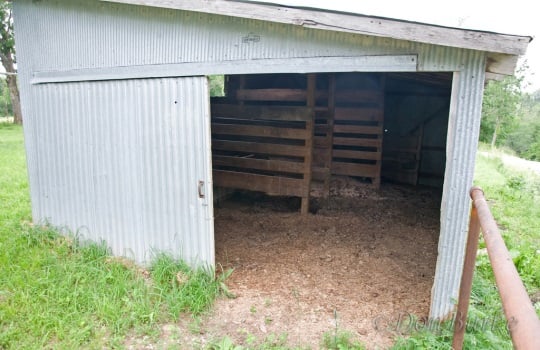
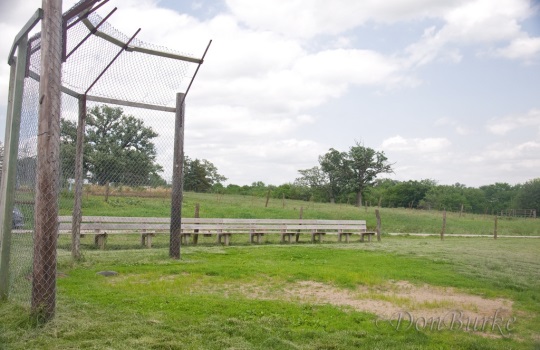

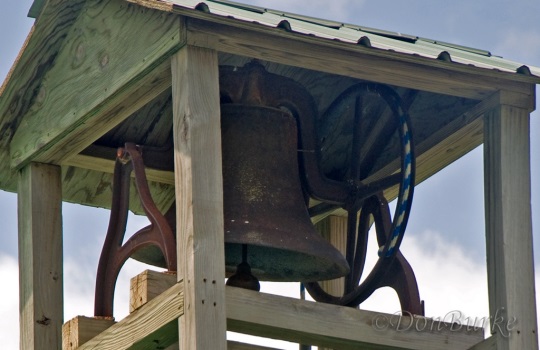
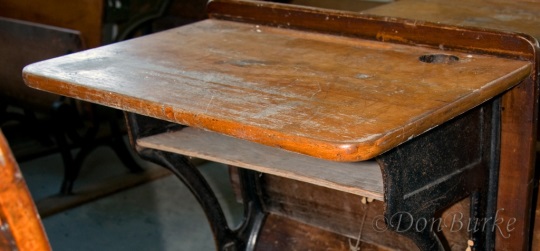
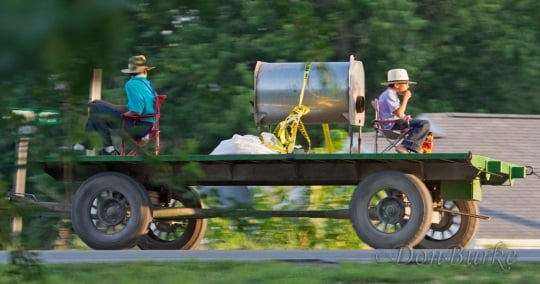


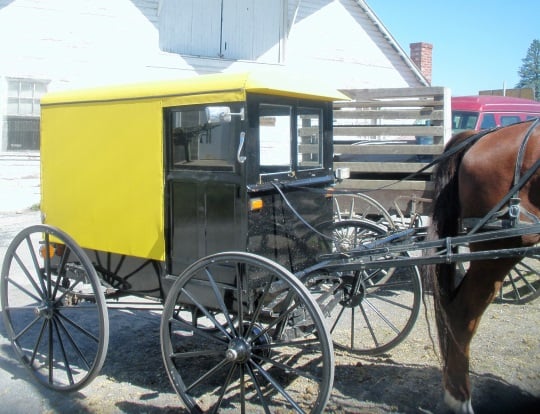
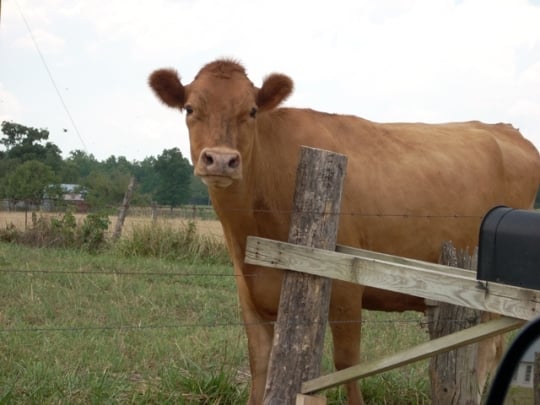
Fantastic pictures & commentary. Thanks!!
That is the kind of community I think of when I think about the Amish. Great innovation on the buggies. Love the solar panels as well.
Awesome!!
Awesome pictures!! Thanks so much for sharing both pictures and knowledge!!
Blessings, Alice
The Amish of Jamesport, Missouri
Amazing pictures, it’s so pretty there and would like to go and visit the area some day..
We are planning to take a day trio there this Spring or early Summer. Can’t wait to go there.
Jameport Amish
We go to Jamesport every Spring. It seems as though the Amish areas are thriving much more than the rest of the town is.
Very nice place to visit, the Amish are right there out of town
Easy to find, Lots of nice shops to visit
Thanks
NIce Photo's
I get the impression that one is very limited in the “visiting” one can do in these communities. You can go to them, drive around the country side, take pictures of Amish life, the country side, of the Amish (from a distance) and maybe it they have them, you can eat and shop in their stores. But it seem like the visits are rather short especially in areas where the Amish are spread over a wide area. How much actual interaction does one do on a visit?
Derek, in my visits to the various Amish communities that I’ve been to so far (8 communities in 5 states) I’ve found that the ease of “visiting” varies a lot from community to community, and even from person to person. As a whole, those areas that are accepting to tourism in general are more accepting of “visiting” face-to-face.
But you make a good point in noting the degree of actual interaction that we get with the Amish. It is’t like going over and visiting grandma’s house, and as much as we’d like for it to feel that way, well, it’s a bit unrealistic. Personally, I think it helps to understand the situation if we imagine what it would be like to reverse the roles. Say we were going about out daily routine of mowing our yard or doing our job (which happened to be located on the same property as our home). Wouldn’t it feel awkward to have some random person we’ve never met pull off the road roll down the windows and start snapping pictures of our car and house? Would we be a bit edgy if they started snapping up shots of our kids? And what about their taking 10-15 minutes just asking us all kinds of questions? And when that happens a dozen times a day not only is it a bit annoying, but it keeps you from the job that puts food on your family’s table. (And feeding an average of 7 kids, 2 parents, and possibly some grandparents — well, you can’t afford to loose much time with repeat distractions. (ha))
Don’t get me wrong, I’m like you and would just love to pull up to a Amish person’s house or meet them somewhere in public and just “chew the fat” to learn all about them. But I have to remember that I’m the one on vacation and my time is free…, but they are in the middle of their workday, and their time is as limited as ours would be in the same situation.
Something you might consider is finding a place where an Amish family rents out a room by the night. My wife and I have spent time at two of these (two different occasions each), one in in Lancaster Co. PA, the other was a working Amish farm in Holmes Co. OH. While the Amish here still have daily routine and chores to do, this is much closer to a chance to really “visit”. And with repeat visits and interactions with the same people you begin to built up actual friendships — and *that* is what makes for a real visit.
Amish Tour
I was born in Jamesport before the Amish settled here in Jamesport which their first settlement in MO in 1953. The Amish are always happy to visit when they have the time. Jamesport is the only Amish Colony in MO that permits tours of their colony and I offer a tour service for charter buses and other groups and accompany you on a 2 1/2 hr. tour where you are actually able to tour a real Amish home and farm and ask questions of the Amish. We also visit some of the Amish stores while learning about the how the Jamesport Amish traditions vary from other Amish and what some of their traditions are. You also have the opportunity to see a 1 room Amish school, saw mill, Amish cemetery, deer farms and much more. Reservations must be made prior to your visit to allow time for arrangements to be made with the Amish farm family.
Thanks!
A special thanks to Erik for including another set of my pictures on his website. And thanks to everyone for all the compliments.
Loved looking at these pictures. We are going to visit friends in that area in May, and we will definitely be stopping by this community. Thanks, Erik!
Outhouses
Thank you so much for such lovely and interesting photos. One question though about the outhouses behind the school. Is there a place that the students use to wash their hands after using the facilities? Whenever I see outhouses I have often thought about whether they are sanitary.
Nadege, I’m afraid that I do not know the answer to that question. But considering the nature of the Amish environment (what with all the horses and other livestock — and all the “waste” that is a natural part of that) I wonder if they are concerned much by this type of sanitation concerns. And when you think about it, even as recently as my own childhood there were outhouses in regular use in the “English” rural areas — all without a place to wash up…, and we weren’t any worse for wear, I guess.
Making what you have better!
I am from the so called Old School! I was always taught from my ancestors, always leave it better than you found it! I am by definition English, and was raised as a dairy farm kid milking cows by hand and farming with horses. I am a veterinarian because of those early values and respect for the animals I have had the privilege to care for. These photos warm my heart when I see the respect still being taught for the land and the livestock which allowed me to pursue my vocation and I still farm as well. I am 63 and am so grateful you all work so hard to bring this joy to me! I was asked if I had the opportunity to go back and change anything would I do it? My answer has always been the same. I would not change anything and I hope you do the same. T.
Excellent set of photos
Thanks!
School Sanitation
I asked my son, Mark, about this. He said that all three of the Belle Center, Ohio Amish schools have outside restrooms. He can’t speak for the Jamesport, MO community because he’s never been there. In the outside restrooms of the Belle Center Schools there are hand sanitizers on a shelf. Also, there are sinks with hot and cold running water inside the basements of the schoolhouse. At almost any Amish school he has seen there is some kind of water source whether inside sinks or outside hand pumps. The outside pumps of course wouldn’t have hot and cold water just cold, cold well water. But, the students could still wash their hands after using the bathrooms.
Washing Hands
I taught in Amish schools for years. In most outhouses in our area, a bottle of hand sanitizer is kept in each outhouse and most also have a sink in the entry hall or basement.
Sanitizer
Sanitizer. That’s something we never had in the outhouses at the schools I attended in grades 1-8. I don’t remember whether we were instructed to wash our hands on re-entering the building. We probably were, but I don’t remember where we would have done it. There may have been a bowl, soap, and shared towel near the drinking water container. Or maybe it was even a towel on a roller. I’m not sure what you call that container – it was a big crock-like thing with a spigot at the bottom. For my first two years in North Dakota, getting drinking water for it was a daily chore at which we had to take turns. We got it from a hand operated pump in the yard of a nearby home. For the first few months of grade 3 (fall 1956) I attended a school that had indoor plumbing, then we moved to Nebraska where it was back to using outhouses. There was a running water spigot in the basement, so getting drinking water for the container in the classroom was easier than having to pump water from an outdoor well.
We did have electric lights in all the schools I attended, but when I was in grad school one of my cohort said the small school he attended in central Minnesota (back before there were Amish people in Minnesota) had neither electricity nor running water. So his stories topped mine.
There may have been occasional grumbling about our having a school that still used outhouses — there was a faction in our community that thought our country school should be closed and that we should merge with the school in town — but our outhouses were far from the only ones.
Definitely the next best thing to being able to travel to all these places.
Thanks Don
Thanks so much for sharing the beautiful photos – and the peek inside the Jamesport community – really appreciate it!
Amish modesty
Since we’re kind of talking about Amish school outhouses I’ll throw in an anecdote that my son, Mark, mentioned to me. It seems that one of the times that he had some of the youth boys over to his house they mentioned that they wished there was a hook on the outhouse door so if they had to sit down to use the bathroom nobody could open the door on them. Mark mentioned this at a monthly school meeting. The one teacher mentioned that he did feel that this modesty issue was a problem for the students. He said that “the same roll of toilet paper can last the whole school year.” The parents didn’t want the outhouse door locked in case some hi-jinks happened in the outhouse and the teacher couldn’t get in. However, now, in all three of the schools’ outhouses, the inside has been reconfigured so that there are separate stalls for the seats with lockable doors on each. Mark figures the same has been done for the girls’ sides but he’s never seen them. Now, that’s progress! Nobody can say the Amish never change!
A lot of the Amish that left Plain City went to Jamesport.
Marcus Yoder
Great Pictures! Thanks for sharing!
My husband was raised Amish in this community, thanks for sharing these photos and for a “trip down memory lane”!
I thoroughly enjoyed all the photos! We still had desks like the one shown here, in the Chicago parochial schools I attended in the 1950’s + ’60’s. When they finally remodeled, they let us kids have the desks. My parents got me one + Mom painted it. I LOVED it. But when my parents died + we sold the house, I lost track of it. Sure wish I still had it!
Thanks for the walk down memory lane…or, at least for allowing me to take a little “detour”. I hope you’ll keep sharing your photos + comments as you visit more Amish settlements.
Alice Mary
Thanks you....
Thank you Alice Mary for your sweet comments. It is a joy to me to take the pictures in the first place — and it doubles the joy to know that others enjoy them along with me.
If you’ve not done so, you can go to my Flickr photo albums (https://www.flickr.com/photos/ozarkinspirations) and see many more pictures — even some new Amish pictures just uploaded today. Or, you can go directly to my collections page (https://www.flickr.com/photos/ozarkinspirations/collections/) where you can find all the Amish pictures pulled together in one place. (I also maintain a notification list to lets people know when I’ve uploaded new images. If you would like to be added to that list, simply send me an email with your own email address on it.)
donate
Hello,
I was at the children’s hospital in the nicu. We saw many of the Amish people who could use car seats to take thier babies home. How can i find out to donate mine, and see what else I can donate. I have 8 children myself and we know how hard it is to get items like that. If someone may know please help. Thank you.
Jamesport Missouri
If we are so curious about the Amish. Look back about the time of your grandparents, grandparents.
I think some of us need to learn a lot more about what is the ways of a simpler life.
Your’s sincerely
Thomas R. Owens
P.S.
Family member of Daniel Bonne, born, and raised a Quaker.
Barn Repair
I own a farm that has a barn in need of repair. There is a shed attached that I would like removed. The farm is probably an hour away to the west, are there builders who travel, is it possible to get an estimate as to cost, how would I contact someone? Thank you.